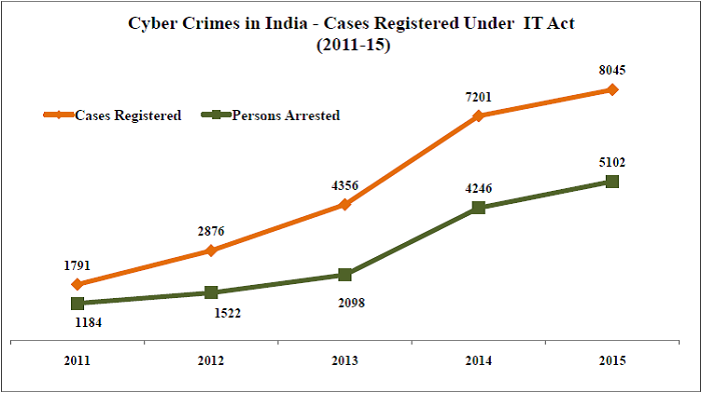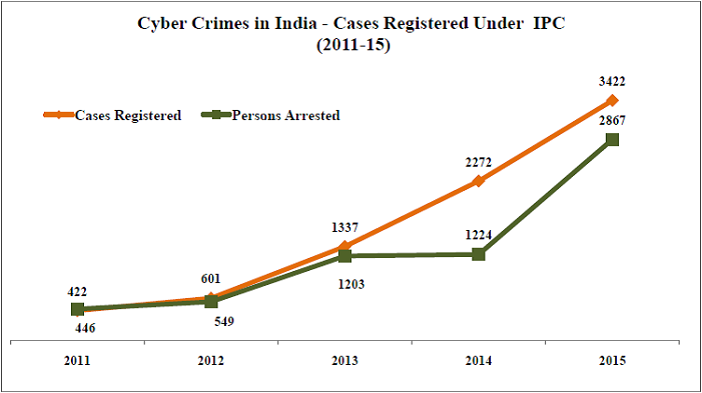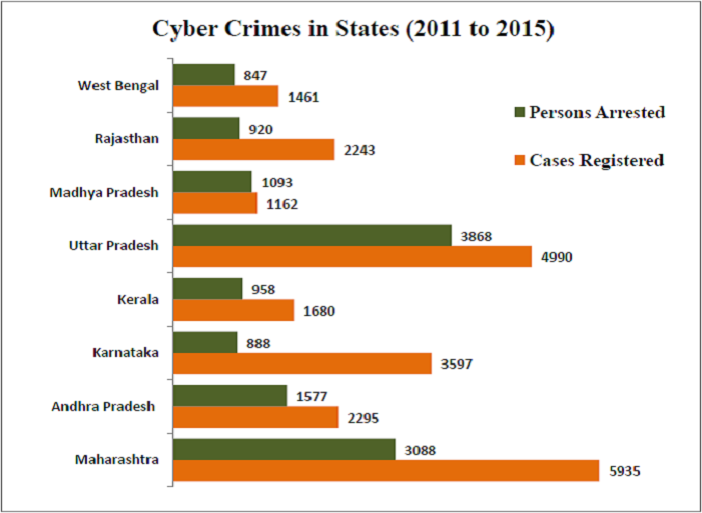[orc]With increasing internet penetration, cyber crimes have also increased in the last few years. Between 2011 and 2015, the number of cyber crimes registered in the country has gone up 5 times. Maharashtra & Uttar Pradesh alone accounted for 1/3rd of these crimes.
With increasing mobile and internet penetration in the country, cyber crimes have also increased proportionately. Between 2011 and 2015, more than 32000 cyber crimes were reported across the country. More than 24000 of these cases are registered under the IT Act and the remaining under the various sections of IPC and other State Level Legislations (SLL).
What are Cyber Crimes?
Cyber Crimes in India are registered under three broad heads, the IT Act, the Indian Penal Code (IPC) and other State Level Legislations (SLL). The cases registered under the IT Act include
- Tampering computer source documents (Section 65 IT Act)
- Loss /damage to computer resource/utility (Section 66 (1) IT Act)
- Hacking (Section 66 (2) IT Act)
- Obscene publication/transmission in electronic form (Section 67 IT Act)
- Failure of compliance/orders of Certifying Authority (Section 68 I T Act)
- Failure to assist in decrypting the information intercepted by Govt Agency (Section 69 IT Act)
- Un-authorised access/attempt to access to protected computer system (Section 70 IT Act)
- Obtaining licence or Digital Signature Certificate by misrepresentation / suppression of fact (Section 71 IT Act)
- Publishing false Digital Signature Certificate (Section 73 IT Act)
- Fraud Digital Signature Certificate (Section 74 IT Act)
- Breach of confidentiality/privacy (Section 72 IT Act)
- Others
On the other hand, cases are also registered under the IPC and those include
- Offences by/against Public Servant (Section 167, 172, 173, 175 IPC)
- False electronic evidence (Section 193 IPC)
- Destruction of electronic evidence (Section 204, 477 IPC)
- Forgery (Section 463, 465, 466, 468, 469, 471, 474, 476, 477A IPC)
- Criminal Breach of Trust (Section 405, 406, 408, 409 IPC)
- Counterfeiting Property Mark (Section 482, 183, 483, 484, 485 IPC)
- Tampering (Section 489 IPC)
- Counterfeiting Currency / Stamps (Section 489A to 489E IPC)
Cyber Crimes up by more than 3 times in 5 years
| Year | IT Act | IPC | ||
|---|---|---|---|---|
| Cases Registered | Persons Arrested | Cases Registered | Persons Arrested | |
| 2011 | 1791 | 1184 | 422 | 446 |
| 2012 | 2876 | 1522 | 601 | 549 |
| 2013 | 4356 | 2098 | 1337 | 1203 |
| 2014 | 7201 | 4246 | 2272 | 1224 |
| 2015 | 8045 | 5102 | 3422 | 2867 |
| Total | 24269 | 14152 | 8054 | 6289 |
The numbers of cases registered under the IT Act and IPC have been growing continuously. The cases registered under the IT act grew by more than 350% from 2011 to 2015. There was almost a 70% increase in the number of cyber crimes under the IT act between 2013 and 2014. The cases registered under the IPC increased by more than 7 times during the period between 2011 and 2015. Similar trend is observed in the number of persons arrested. The government also acknowledges the increase in the number of such crimes and that the introduction of technologies, devices including smart phones and complex applications, and rise in usage of cyber space for businesses has resulted in such an increase.
Maharashtra & Uttar Pradesh on the top
The list of states with the highest incidence of cyber crime for the period 2011 to 2015 throws no surprises. Maharashtra tops the list with more than 5900 cases in the 5 years followed by Uttar Pradesh with close to 5000 such cases. Karnataka is third with more than 3500 cases. The top states in this list are the ones with a greater internet subscriber base. The bottom 10 are relatively smaller states with lower population & lower internet penetration.
What is the Government Doing?
The government says that use of social media has also emerged as a key tool for committing cyber crimes and attacks that affect nation and society and is conscious of increase in cyber crimes. It has taken various steps in the form of awareness, training, legal framework, emergency response and implementation of best practices to prevent occurrence of such cyber crimes
In response to a question in the Lok Sabha, the government mentioned that the following measures are being taken to tackle cyber crimes.
- The Ministry of Home Affairs has issued an Advisory to the State Governments and Union Territory Administrations on Cyber Crime. The State Governments have been advised to build adequate technical capacity in handling cyber crime including technical infrastructure, cyber police stations and trained manpower for detection, registration, investigation and prosecution of cyber crimes.
- A major programme has been initiated on development of cyber forensics tools, setting up of infrastructure for investigation and training of the users, particularly police and judicial officers in use of this tool to collect and analyse the digital evidence and present them in Courts.
- Indian Computer Emergency Response Team (CERT-In) and Centre for Development of Advanced Computing (CDAC) are involved in providing basic and advanced training to Law Enforcement Agencies, Forensic labs and judiciary on the procedures and methodology of collecting, analysing and presenting digital evidence.
- Cyber forensics training lab has been set up at Training Academy of Central Bureau of Investigation (CBI) to impart basic and advanced training in Cyber Forensics and Investigation of Cyber Crimes to Police Officers associated with CBI. In addition, Government has set up cyber forensic training and investigation labs in the States of Kerala, Assam, Mizoram, Nagaland, Arunachal Pradesh, Tripura, Meghalaya, Manipur and Jammu & Kashmir for training of Law Enforcement and Judiciary in these States.
- In collaboration with Data Security Council of India (DSCI), NASSCOM, Cyber Forensic Labs have been set up at Mumbai, Bengaluru, Pune and Kolkata for awareness creation and training programmes on Cyber Crime investigation. National Law School, Bangalore and NALSAR University of Law, Hyderabad are also engaged in conducting several awareness and training programmes on Cyber Laws and Cyber crimes for judicial officers.
- The Indian Computer Emergency Response Team (CERT-In) issues alerts and advisories regarding latest cyber threats and countermeasures on regular basis. CERT-In has published guidelines for securing the websites, which are available on its website (www.cert-in.org.in). CERT-In also conducts regular training programme to make the system administrators aware about secure hosting of the websites and mitigating cyber attacks.
- Government has decided to provide a centralized citizen portal through Crime and Criminal Tracking Network and Systems(CCTNS) for registering online cyber crime complaints. The Ministry of Home Affairs has also in-principle approved to set up an Indian Cyber Crime Coordination Centre (I4C) to fight against cyber crime in the country and establish an open platform for victims to raise cybercrime complaints with the protocol for resolution such as online crime reporting, to support and coordinate electronic investigations of cybercrime, assist the law enforcement agencies in criminal investigation etc.
- The cyber space is being closely monitored by the Government in respect of the situation of radicalization attempts. The Government has also directed the intelligence agencies to identify potential recruits and keep them under surveillance.






3 Comments
Pingback: Failure: Indian Cyber-Security – DIGITAL FORENSICS | CYBER OF THINGS
Pingback: More than 700 India Government websites hacked between 2013 and 2016 – SecureFirstSolutions blog
kislay chaudhary ft. in India today–On Exposed Nasty Truth About ISIS Supporters